
Albania, officially the Republic of Albania, is a country in Southeast Europe on the Adriatic and Ionian Sea within the Mediterranean Sea. It shares land borders with Montenegro to the northwest, Kosovo to the northeast, North Macedonia to the east, Greece to the south and maritime borders with Greece, Montenegro and Italy to the west.

The Albanians are an ethnic group native to the Balkan Peninsula and are identified by a common Albanian ancestry, culture, history and language. They primarily live in Albania, Kosovo, North Macedonia, Montenegro, Serbia as well as in Croatia, Greece and Italy. They also constitute a diaspora with several communities established in the Americas, Europe and Oceania.

The BalkansBAWL-kənz, also known as the Balkan Peninsula, is a geographic area in Southeast Europe with various definitions and meanings, including geopolitical and historical. The region takes its name from the Balkan Mountains that stretch throughout the whole of Bulgaria from the Serbian–Bulgarian border to the Black Sea coast. The Balkan Peninsula is bordered by the Adriatic Sea on the northwest, the Ionian Sea on the southwest, the Aegean Sea in the south and southeast, and the Black Sea on the east and northeast. The northern border of the peninsula is variously defined. The highest point of the Balkans is Mount Musala, 2,925 metres (9,596 ft), in the Rila mountain range, Bulgaria.

Kosovo, officially the Republic of Kosovo, is a partially recognized state and disputed territory in Southeastern Europe.
Albania is a unitary parliamentary constitutional republic, where the President of Albania is the head of state and the Prime Minister of Albania the head of government in a multi-party system. The executive power is exercised by the Government and the Prime Minister with its Cabinet. Legislative power is vested in the Parliament of Albania. The judiciary is independent of the executive and the legislature. The political system of Albania is laid out in the 1998 constitution. The Parliament adopted the current constitution on 28 November 1998. Due to political instability, the country has had many constitutions during its history. Albania was initially constituted as a monarchy in 1913, briefly a republic in 1925, then it returned to a democratic monarchy in 1928. It later became a socialist republic until the restoration of capitalism and democracy in 1992.
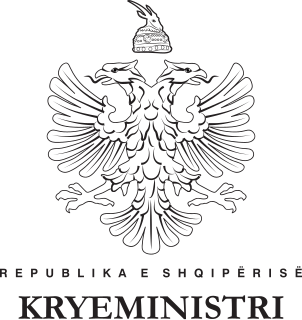
The prime minister of Albania, officially styled Prime Minister of the Republic of Albania, is the head of government of the Republic of Albania and as well the most powerful and influential person in Albanian politics. The prime minister holds the executive power of the nation and represents the Council of Ministers and chairs its meetings.
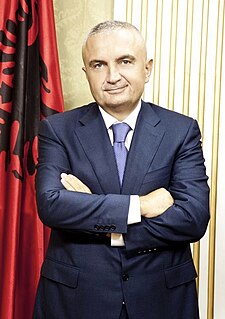
The president of Albania, officially styled President of the Republic of Albania is the head of state, commander-in-chief of the military and the representative of the unity of the Albanian people.
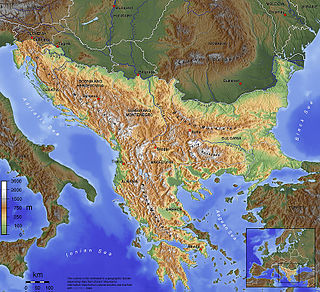
Southeast Europe or Southeastern Europe (SEE) is a geographical region of Europe, consisting primarily of the coterminous Balkan Peninsula. There are overlapping and conflicting definitions as to where exactly Southeastern Europe begins or ends or how it relates to other regions of the continent. Sovereign states that are, at least partially, included in the region are, in alphabetical order: Albania, Bosnia and Herzegovina, Bulgaria, Croatia, Greece, Kosovo, Montenegro, North Macedonia, Romania, Serbia, Slovenia, and East Thrace.

The Party of Labour of Albania (PLA), sometimes referred to as the Albanian Workers' Party (AWP), was the vanguard party of Albania during the communist period (1945–1991) as well as the only legal political party. It was founded on November 8, 1941, as the Communist Party of Albania, but its name was changed in 1948. In 1991, the party was succeeded by the Socialist Party of Albania. For most of its existence, the party was dominated by its First Secretary, Enver Hoxha, who was also the de facto leader of Albania.
Regular elections in Albania are mandated by the Constitution and legislation enacted by Parliament. The Parliament (Kuvendi) has 140 members elected for four-year terms. The electoral system is closed list proportional representation. There are 12 multi-member constituencies corresponding to the country's 12 administrative regions. Within any constituency, parties must meet a threshold of 3 percent of votes, and pre-election coalitions must meet a threshold of 5 percent of votes.

The Parliament of Albania or Kuvendi is the unicameral representative body of the citizens of the Republic of Albania; it is Albania's legislature. The Parliament is composed of not less than 140 members elected to a four-year term on the basis of direct, universal, periodic and equal suffrage by secret ballot. The Parliament is presided over by a Speaker of the Parliament, who is assisted by at least one deputy speaker. The electoral system is based on party-list proportional representation. There are 12 multi-seat constituencies, corresponding to the country's administrative divisions.
The Albanian mafia or Albanian organized crime are the general terms used for criminal organizations based in Albania or composed of ethnic Albanians. Albanian organized crime is active in Europe, North America, South America, and various other parts of the world including the Middle East and Asia. The Albanian Mafia participates in a diverse range of criminal enterprises including trafficking in drugs, arms, humans, and human organs. The Albanian criminal scenario is characterized by diversified criminal plans which, in their complexity, show one of the highest criminal capacities in the world. In Albania alone, there are over 15 mafia families that control organized crime. According to WikiLeaks reports, the Albanian mafia has monopolized various international affiliations from as far east as Israel, to as far west as South America. These reports primarily indicate a strong connection between politicians and various Albanian mafia families. According to the Research Institute for European and American Studies (RIEAS), Albanian mafia groups are hybrid organizations, often involved in both criminal and political activities.

Albania applied for European Union (EU) membership on 28 April 2009, and has since June 2014 been an official candidate for accession to the EU, and is on the current agenda for future enlargement of the EU. Albania is currently receiving €1.2bn of developmental aid until 2020 from the Instrument for Pre-Accession Assistance, a funding mechanism for EU candidate countries.
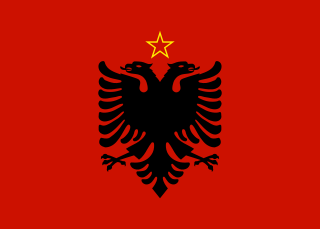
Albania, officially as the People's Socialist Republic of Albania, was ruled by a Marxist-Leninist government from 1946 to 1992. From 1944 to 1946, it was known as the Democratic Government of Albania and from 1946 to 1976 as the People's Republic of Albania.
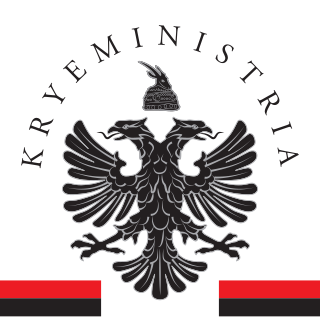
The Council of Ministers is the executive branch that constitutes the Government of Albania. The Council is led by the Prime Minister of Albania. The prime minister is nominated by the President from among those candidates, who enjoy majority support in the Parliament; the candidate is then chosen by the Parliament. In the absence of the prime minister, the Deputy Prime Minister takes over his functions. There are 19 other government members, serving as deputy prime ministers, government ministers or both; they are chosen by the prime minister and confirmed by the Parliament.

The Academy of Sciences of Albania, founded in 1972, is the most important scientific institution in Albania. In the 1980s, several research institutes began at the University of Tirana were transferred to the Academy's jurisdiction. The institution includes the most distinguished scientists, also called "academics", that are involved in research centers and other organisms inside and outside Albania. As of 2009, the Academy has 23 regular members, 10 associated members, one permanent member, and 26 honor members.
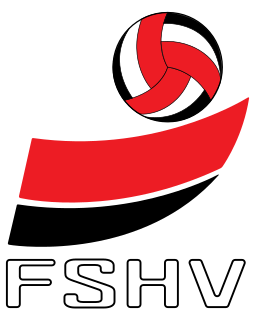
The Albanian Volleyball Federation (FSHV) is the head governing body for the sport of professional volleyball in Albania. It organises the first division, second division leagues and a cup competition.

The Albanian Swimming Federation is the national governing body of aquatic sports in Albania, ranging from swimming, diving, synchronized swimming, open water swimming, and water polo. The federation is tasked with the development, promotion and international representation of swimming in Albania.

The Albanian Weightlifting Federation (FSHP) is a permanent non-profit organization founded in 1949 in Tirana, Albania.
















